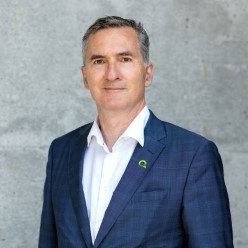Board of Directors & Management
|
| |
M. Joe Bélanger Mme Andréanne Boucher Mme Julie Caron Mme France Castonguay Dre Marie-José Clermont Mme Micheline Cyr Asselin Dre Catherine Girardin M. Yves Guindon Mme Julie Labbé Dr Jean-François Lizé M. Yannick Poulin
Observers Mme Chantal Bilodeau Dr Prosanto Chaudhury M. Denis Ouellet Dr Matthew J. Weiss |
Committees
Three committees report to the Board of Directors: the Ethics Committee, the Medical/Scientific Advisory Committee (which is in turn supported by subcommittees), as well as the Finance and Audit Committee.
Ethics Committee
This committee is made up of eight members: four who represent health professionals, and another four who provide opinions relating to ethics, the law, the public and employees of Transplant Québec’s clinics.
The committee is mandated with fostering discussion on the ethical issues and challenges surrounding organ donation and transplantation, such as the anonymity of exchanges between deceased donors or their loved ones, living donors and recipients. Their opinions and recommendations are presented to the Board of Directors.
Medical/Scientific Advisory Committee
This committee is made up of 12 people representing the organ subcommittees. It is supported by Transplant Québec’s Medical Department, the Office of the Chief Executive Officer, the Clinical Services Department, and the Compliance and Quality Department. Its mandate is to drafting reports and submit recommendations to the Board of Directors with respect to organ donation and transplantation standards, practices and procedures. Moreover, the committee oversees the Kidney-Pancreas Subcommittee and the Thoracic Organs Subcommittee.
Finance and Audit Committee
The four members of this committee include three from the Board of Directors (appointed by the Board) and the Chief Executive Officer, who also serves as the board’s secretary and treasurer. Its mandate is to assist the Board of Directors in exercising its responsibility for monitoring the quality and integrity of its financial information.
Transplant Québec, Corporation
Transplant Québec is a non-profit corporation (NPO) legally constituted pursuant to Part II of the Companies Act (Quebec). The corporation (or organization) receives its mandate from the province’s health and social services department, the Ministère de la Santé et des Service sociaux (MSSS) and carries out that mandate accordingly. The organization’s operating budget derives mainly from the MSSS, which provides the annual budget for the organization’s fiscal year, extending from April 1 to March 31 of the following year.
Under the provisions of the Act, Transplant Québec adopted General bylaws respecting Internal Corporate Governance at a General Meeting of its members on June 14, 2011 (most recent version).
Also in keeping with the Act, the corporation defines two member categories: active members and honorary members.
Active members
Active members may include any natural person (individual) or legal person (corporation or organization) appointed by the Board of Directors, who meet all eligibility criteria determined by resolution of the Board of Directors. The corporation’s Board of Directors admits active members if they hold the required qualifications, have been recommended by at least one member in good standing, have applied for membership using the appropriate form, and have included the applicable membership fee, if any. Active members are considered voting members at the corporation’s annual general meetings (AGM).
The appropriate membership application form may be obtained from the Chief Executive Officer’s assistant. No fee is currently charged.
Honorary members
The status of Honorary (non-voting) Member may be granted, at the Board of Directors’ discretion, to any natural or legal person who has rendered outstanding service to the corporation through his or her work, dedication or donations, or to any natural or legal person who shows an intention to promote the corporation’s interests and objectives or deserves Honorary Member status due to his or her memorable, noteworthy or exemplary behaviour with regard to the corporation.
Annual General Meeting (AGM) of the corporation (Transplant Québec)
Members are convened to the corporation’s Annual General Meeting (AGM) and, occasionally, to one or more special meetings. During the meetings, active members:
- elect the corporation’s administrators, taking into consideration the positions to be filled on the Board of Directors;
- receive the financial statements and auditor’s report;
- appoint the auditor;
- establish or authorize the Board of Directors to determine the auditor’s compensation.
They may also deal with and dispose of any such other business as may lawfully come before the meeting.
Presentation of the departments
1. Office of the Chief Executive Officer
The Office of the Chief Executive Officer is in charge of Transplant Québec’s administrative activities, operations and mission. TheChief Executive Officer is also the organization’s official spokesperson.
2. Medical
The Medical Department is in charge of the clinical aspects of organ donation. The department advises the organization’s clinical staff on all questions regarding an organ donor or the organ donation process and makes all decisions of a medical nature.
Five physicians provide services at Transplant Québec including the Transplantation Medical Director and the Organ Donation Medical Director.
3. Clinical Services
The Clinical Services Departments in Montreal and Quebec City coordinate the organ donation process. Clinical coordinators/advisors intervene as soon as the organization receives a potential offer from an organ donation procurement organization at a hospital in Quebec or outside the province. This department also manages Canada’s one and only list of people awaiting an organ. The Clinical Services departments are staffed 24 hours a day, seven days a week.
4. Hospital Development and Education
The Hospital Development ans Education Department gives courses to raise awareness of the donation process among hospital professionals and managers and develop a culture of organ and tissue donation. The training thus provided contributes to the continuous improvement of good practices in the donation process up to and including the retrieval. This department, whose services are provided 24 hours a day, seven days a week, supervises the organ and tissue donation liaison and resource nurses at the hospitals.
5. Compliance and Quality
The Compliance and Quality Department ensures that all activities related to the organization’s clinical components are conducted in compliance with the safety and quality laws, regulations, standards, policies and guidelines in effect.
6. Communications and Public Relations
The Communications and Public Relations Department informs and educates the public about the various issues surrounding organ donation by developing strategies and organizing targeted activities. This department also manages public relations activities in addition to ensuring compliance with the organization’s identity and image. Responsable de l’accès à l’information ?
7. Administrative Services
The Administrative Services Department covers all activities linked to human resource management (staffing, labour relations, salary management and employee benefits), financial management (budget, financial analyses, payment of salaries) and IT management (IT asset security, oversight of IT activities). Les services administratifs sont également responsables de la bonne gestion du Programme de remboursement des dépenses aux donneurs vivants ?
Budget:
États financiers au 31 mars 2023
Évolution de l'actif net et flux de trésorerie 31 mars 2023
*French version only
Health Canada compliance inspection
In 2010, Transplant Québec received a compliance inspection exit notice. The inspection was conducted to verify that the organization was in compliance with the Safety of Human Cells, Tissues and Organs for Transplantation Regulations (CTO Regulations) in effect since December 2007. At the time of the inspection, Transplant Québec demonstrated that the activities it conducts are in compliance with the Food and Drugs Act and its associated Regulations. The inspections were successful in 2010, 2013, 2016, 2019 and 2022.


